英语词汇学第五章复习资料
- 格式:doc
- 大小:58.50 KB
- 文档页数:10

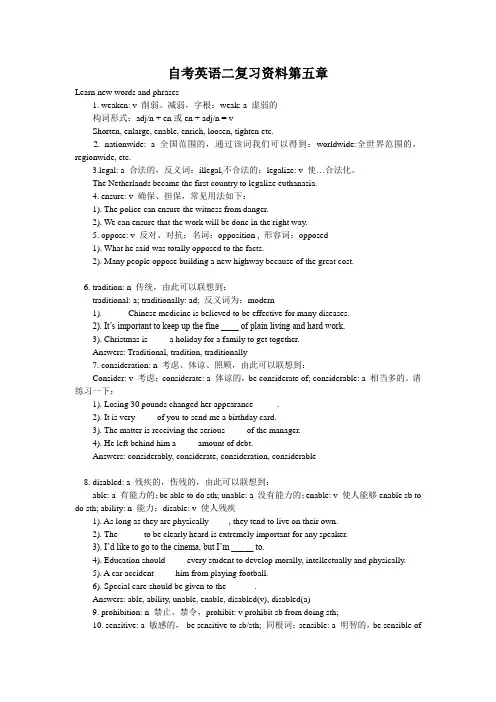
自考英语二复习资料第五章Learn new words and phrases1. weaken: v 削弱、减弱,字根:weak: a 虚弱的构词形式:adj/n + en或en + adj/n = vShorten, enlarge, enable, enrich, loosen, tighten etc.2. nationwide: a 全国范围的,通过该词我们可以得到:worldwide:全世界范围的,regionwide, etc.3.legal: a 合法的,反义词:illegal,不合法的;legalize: v 使…合法化。
The Netherlands became the first country to legalize euthanasia.4. ensure: v 确保、担保,常见用法如下:1). The police can ensure the witness from danger.2). We can ensure that the work will be done in the right way.5. oppose: v 反对、对抗;名词:opposition , 形容词:opposed1). What he said was totally opposed to the facts.2). Many people oppose building a new highway because of the great cost.6. tradition: n 传统,由此可以联想到:traditional: a; traditionally: ad; 反义词为:modern1). _____ Chinese medicine is believed to be effective for many diseases.2). It’s important to keep up the fine ____ of plain living and hard work.3). Christmas is ____ a holiday for a family to get together.Answers: Traditional, tradition, traditionally7. consideration: n 考虑、体谅、照顾,由此可以联想到:Consider: v 考虑;considerate: a 体谅的,be considerate of; considerable: a 相当多的。
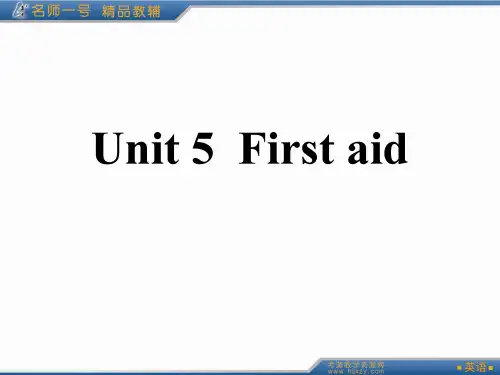
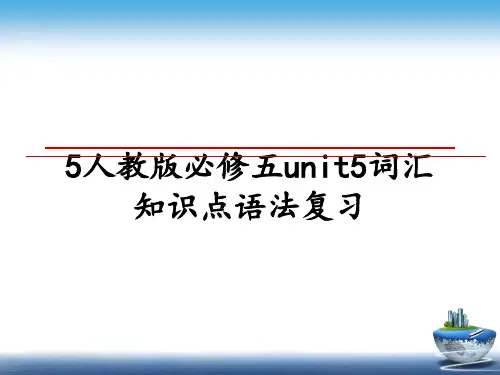
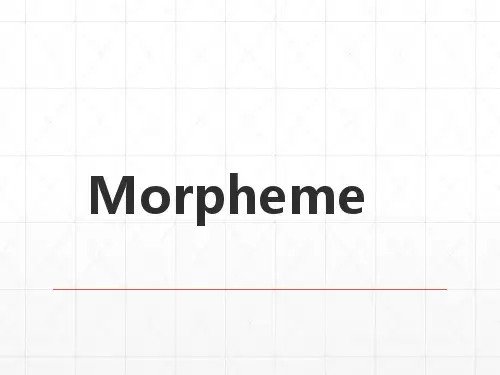

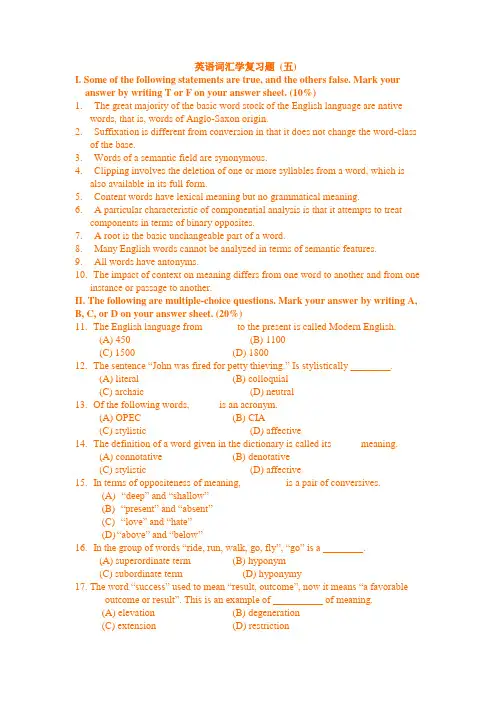
英语词汇学复习题(五)I. Some of the following statements are true, and the others false. Mark your answer by writing T or F on your answer sheet. (10%)1.The great majority of the basic word stock of the English language are nativewords, that is, words of Anglo-Saxon origin.2.Suffixation is different from conversion in that it does not change the word-classof the base.3.Words of a semantic field are synonymous.4.Clipping involves the deletion of one or more syllables from a word, which isalso available in its full form.5.Content words have lexical meaning but no grammatical meaning.6. A particular characteristic of componential analysis is that it attempts to treatcomponents in terms of binary opposites.7. A root is the basic unchangeable part of a word.8.Many English words cannot be analyzed in terms of semantic features.9.All words have antonyms.10.The impact of context on meaning differs from one word to another and from oneinstance or passage to another.II. The following are multiple-choice questions. Mark your answer by writing A, B, C, or D on your answer sheet. (20%)11.The English language from ______ to the present is called Modern English.(A) 450 (B) 1100(C) 1500 (D) 180012.The sentence “John was fired for petty thieving.” Is stylistically ________.(A) literal (B) colloquial(C) archaic (D) neutral13.Of the following words, _____ is an acronym.(A) OPEC (B) CIA(C) stylistic (D) affective14.The definition of a word given in the dictionary is called its _____ meaning.(A) connotative (B) denotative(C) stylistic (D) affective15.In terms of oppositeness of meaning, ________ is a pair of conversives.(A)“deep” and “shallow”(B)“present” and “absent”(C)“love” and “hate”(D)“above” and “below”16.In the group of words “ride, run, walk, go, fly”, “go” is a ________.(A) superordinate term (B) hyponym(C) subordinate term (D) hyponymy17. The word “success” used to mean “result, outcome”, now it means “a favorableoutcome or result”. This is an example of __________ of meaning.(A) elevation (B) degeneration(C) extension (D) restriction18. The language the early immigrants brought them to America was differentfrom present English; the greatest difference lies in ________.(A) spelling (B) pronunciation(C) grammar (D) vocabulary19. _________ serves as a typical example of euphemism.(A) “Pious” meaning “hypocritically virtuous”(B) “A mental hospital” referring to “a madhouse”(C) “A landscape architect” meaning “a gardener”(D) “Slow learners” referring to “underachievers”1.Oxford English Dictionary is a ___________ dictionary.(A) pocket (B) medium-size(C) descriptive (D) prescriptiveIII. Decide whether each of the following words is a A) simple word, B) compound word, C) derived word or D) shortened form. Mark your answer on the answer sheet. (10%)21. acidhead 26. fashion22. formal 27. recycle23. preplant 28. honesty24. lab 29. phone25. ready 30. ashtrayIV. Explain the following terms with appropriate examples. Do it on the answer sheet. (10%)31. back-formation32. polysemyV. Give a short answer to the following questions. Do it on the answer sheet. (30%)33. What is the difference between a morpheme and a syllable? Illustrate yourpoints with examples.34. Explain conventionality and motivation. Give examples.VI. Give a longer answer (150-200 words) to the following question. Do it on the answer sheet. (20%)35. Context is very important for the understanding of word meaning. How iscontext classified?英语词汇学参考答案(五)I. Some of the following statements are true, and the others false. Mark your answer by writing T or F on your answer sheet. (10%)1. T 2. F 3. F 4. T 5. F 6. T 7. T 8. T 9.F 10. TII. The following are multiple-choice questions. Mark your answer by writing A, B, C, or D on your answer sheet. (20%)11. C 12. B 13. A 14. B 15. D16. A 17. D18. D 19.B 20. CIII. Decide whether each of the following words is a A) simple word,B) compound word, C) derived word or D) shortened form. Mark your answer on the answer sheet. (10%)21. B 26. A22. C 27. C23. C 28. C24. D 29. D25. A 30. BIV. Explain the following terms with appropriate examples. Do it on the answer sheet. (10%)31. Back-formation is a term used to refer to a type of word-formation by which a shorter word is coined by the deletion of a supposed affix from a longer form already present in the language. For example, the verb “resurrect” was formed from the noun “resurrection” by removing the supposed derivative suffix “-ion”. 32. Polysemy is a common feature peculiar to all natural languages. There are words that have two or three senses, and the most commonly used ones can have as many as over a hundred. However, when a word is first coined, it is always monosemic. But in the course of development, the same symbol must be used to express more meanings, the result is polysemy. For example, the word “fair” has various meanings; (of results) average, quite good”; (of attitude, behaviour) just and honest; impartial”; (of the weather) clear and sunny”; (of amount) satisfactory, abundant”, etc. V. Give a short answer to the following questions. Do it on the answer sheet. (30%)33. What is the difference between a morpheme and a syllable? Illustrate your points with examples.A morpheme is the smallest meaningful linguistic unit of a language, not divisible or analyzable into smaller forms.A morpheme is not identical with a syllable, since the latter had nothing to do with meaning. A morpheme may be represented by one syllable, like boy and child, or by two or more syllables, as in la·dy, croc·o·dile, and sal·a·man·der. Often the syllabic structure of a word and its morphemic structure do not correspond, as shown in the above examples where a morpheme is represented by more than one syllable. Another good example is the word disagreeable, which consists of five syllables as against three morphemes(dis+agree+able).34. Explain conventionality and motivation. Give examples.Most English words are conventional, arbitrary symbols; consequently, there is no intrinsic relation between the sound symbol and its sense. E.g. the thing called “house” in English, is called maison in French, 房子(fang zi) in Chinese, dom in Russian, and casa in Spanish. A more convincing evidence of conventional and arbitrary nature of the connection between sound symbol and meaning can be illustrated by a set of homophones, write, right and rite. They are pronounced the same but convey entirely different meanings.Motivation refers to the connection between word symbol and its sense. The great majority of English words are nonmotivated, since they are conventional, arbitrary symbols. However, there is a small group of words that can be described as motivated.Motivation can arise in three major ways: 1. Phonetic motivation: words phonetically motivated are called echoic or onomatopoeic words, whose pronunciation suggests the meaning. E.g. woof of a dog, miaow of a cat; 2.Morphological motivation: A word is morphologically motivated when a direct connection can be observed between the morphemic structure of the word and its meaning. E.g. readable means “that can be read”, modernize means “ to make sth modern”; 3. Se mantic motivation: refers to motivation based on semantic factors, it is a kind of mental association. E.g. a stony heart, the leg of a table, etc.VI. Give a longer answer (150-200 words) to the following question. Do it on the answer sheet. (20%) Context is very important for the understanding of word meaning. How is context classified?Context can be classified into two major types: linguistic context and extra-linguistic context/context of situation.A. Linguistic context, which can further be divided into three types:1) Lexical context: lexical context refers to the lexical items combined with a given polysemous word. For instance, the verb make can be used in many different senses when it is combined with different lexical items, e.g.:The regulations were made (enacted) to protect children.We made (had) a good lunch before leaving.The train was making(traveling at a speed of) 70 miles an hour.2) Grammatical context: In grammatical context, the syntactic structure of the context determines various individual meanings of a polysemous word. Take the verb get for example; its meaning varies in different syntactical structures:get+n.(meaning “to receive”): I got a letter today.Get+adj. (meaning “to become”): He’s getting better.Get+infinitive(meaning “to succeed in doing”): If I get to see him, I’ll tell him.3) Verbal context in its broad sense: the verbal context, in its braodest sense, may cover an entire passage, or even an entire book, and in some cases even the entire social or cultural setting. B. Extra-linguistic context/Context of situationBesides linguistic context, extra-linguistic context or context of situation also exerts a considerable influence on word meaning. It includes:1) The actual speech situation in which a word (or an utterance, or a speech event) occurs. E.g. the word operation may mean “a surgical operation” in the situation of a hospital, a strategic movement in the situation of military actions, or the way a machine works when related to mechanics.2) The entire cultural background against which a word, or an utterance or a speech event has to be set. E.g. the word peasant means totally different ideas in the western and Chinese cultures.。
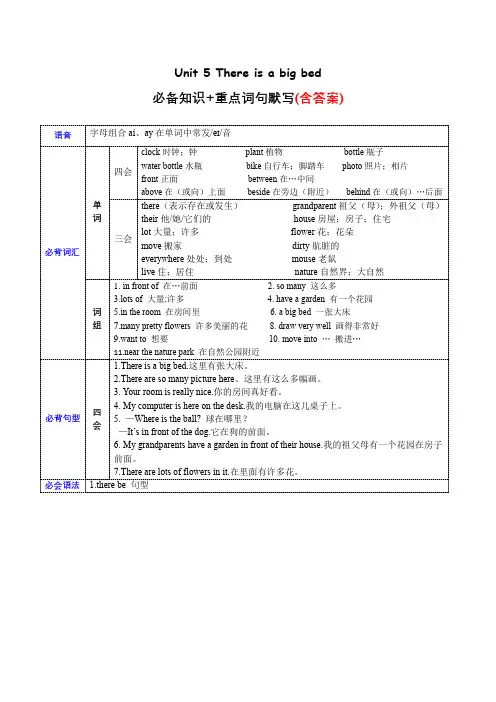
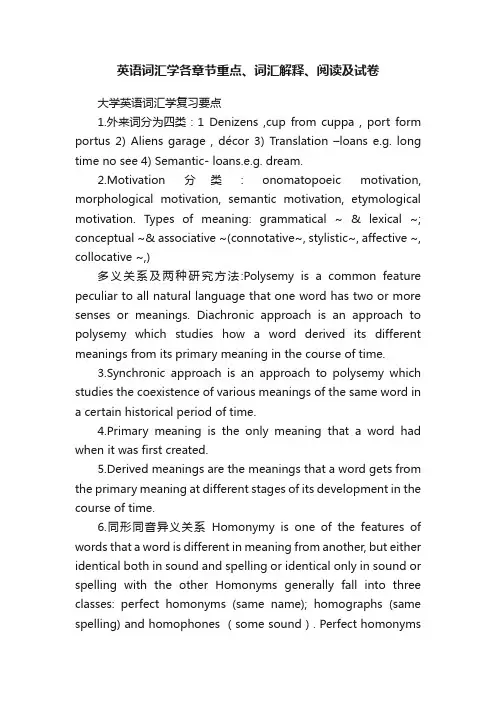
英语词汇学各章节重点、词汇解释、阅读及试卷大学英语词汇学复习要点1.外来词分为四类:1 Denizens ,cup from cuppa , port form portus 2) Aliens garage , décor 3) Translation –loans e.g. long time no see 4) Semantic- loans.e.g. dream.2.Motivation 分类:onomatopoeic motivation, morphological motivation, semantic motivation, etymological motivation. Types of meaning: grammatical ~ & lexical ~; conceptual ~& associative ~(connotative~, stylistic~, affective ~, collocative ~,)多义关系及两种研究方法:Polysemy is a common feature peculiar to all natural language that one word has two or more senses or meanings. Diachronic approach is an approach to polysemy which studies how a word derived its different meanings from its primary meaning in the course of time.3.Synchronic approach is an approach to polysemy which studies the coexistence of various meanings of the same word ina certain historical period of time.4.Primary meaning is the only meaning that a word had when it was first created.5.Derived meanings are the meanings that a word gets from the primary meaning at different stages of its development in the course of time.6.同形同音异义关系Homonymy is one of the features of words that a word is different in meaning from another, but either identical both in sound and spelling or identical only in sound or spelling with the other Homonyms generally fall into three classes: perfect homonyms (same name); homographs (same spelling) and homophones (some sound). Perfect homonymsare those words identical both in sound and spelling, but different in meaning, e.g. bear /bea/ (n) a large heavy animal; bear /bea/ (v) to put up with. Homographs are the words identical only in spelling but different in sound and meaning, e.g. saw / / (v) to scatter seeds; sow /sau/ (n) female adult pig. Homophones refer to the words identical only in sound but different in spelling and meaning, e.g. dear /dia/ (n) a loved person; deer /dia/ (n) a kind of animal.7.同形同音异义词与多义词的区别Perfect homonyms and polysemants are fully identical with regard to spelling and pronunciation. This creates the problem of differentiation. The fundamental difference between homonyms and polysemants lies in the fact that the former refers to different words which happen to share the same form and the latter is the one and same word which has several distinguishable meanings. One important criterion is to see their etymology, i.e. homonyms are from different sources whereas a polysemant is from the same source which has acquired different meanings in the course of development. The second principal consideration is semantic relatedness. The various meanings of a polysemant are correlated and connected to one central meaning to a greater or lesser degree, e. g. neck (See 6.1 Polysemy) . On the other hand, meanings of different homonyms have nothing to do with one another. In dictionaries, a polysemant has its meanings all listed under one headword whereas homonyms are listed as separate entries.8.同义关系Synonyms are words which share the same or nearly the same meaning with each other but different in sound and spelling. There are absolute synonyms and relative synonyms which result from borrowing, dialects and regional English,figurative and euphemistic use of words, coincidence with idiomatic expressions. There exists the difference between or among synonyms in terms of their denotation, connotation or application. Absolute synonyms or complete synonyms are words which are identical in meaning in all its aspects. Relative synonyms or near-synonyms are similar or nearly the same in denotation, but embrace different shades of meaning or different degrees of a given quality.9.Sources of Synonyms 1) Borrowing 2)Dialects and regional English 3) Figurative and euphemistic use of words 4) Coincidence with idiomatic expressions10.如何区分同义词?1Difference in denotation2 Difference in connotation 3 Difference in application11.What are the characteristics of antonyms?12.1) Antonyms are classified on the basis of semantic opposition 2) A word which has more than one meaning can have more than one antonym. 3) Antonyms differ in semantic inclusion.4) Contrary termsare gradable antonyms, differing in degree of intenisty, so each has its own corresponding opposite.13.上下义关系:Hyponymy deals with the relationship of semantic inclusion. That is, the meaning of a more specific word is included in that of another more general word. Superordinates refer to some general words; subordinates denote those more specific words. Hyponymy can be described in terms of tree-like graphs, with higher-order superordinates above the lower subordinates. But their status either as superordinate or subordinate is relative to other terms. For example, horse, dog, pig are subordinates in relation to animal, but superordinates of mare, hound and boar, Animal itself becomesa subordinate of creature. And creature in turn becomes14.词义变化的种类There are five types of meaning, changes: extension, narrowing, degradation, elevation, and transfer among which extension and narrowing are the most common. Changes in meaning can be accounted for from extra-linguistic factors (historical reason, class reason, and psychological reason) and intra-linguistic factors (shortening, the influx of borrowing, and analogy).15.词义的扩大Extension is a process by which a word with a specialized sense is generalized to cover a broader or less16.definite concept. Compare the following;词义的缩小Narrowing is a process by which a word of wider meaning acquires a specialized sense;词义的升华Elevation is a process by which a word moves from a derogatory or neutral sense to a neutral and/or appreciative sense;词义的降格Degradation is a process by which a word of reputation slides into a pejorative use,;词义的转移Transfer is a process by which a word denoting one thing changes to refer to a different but related thing. Paper serves as an example. This word formerly denoted an African plant papyrus, which was once used to make paper. In modern times, paper is made from rags, wood, straw and the like, but the product has retained the same name. There is associated transfer. There are other kinds of transfer, such as, concrete to abstract, abstract to concrete and transfer of sensation.17.语境的种类:非语言语境。
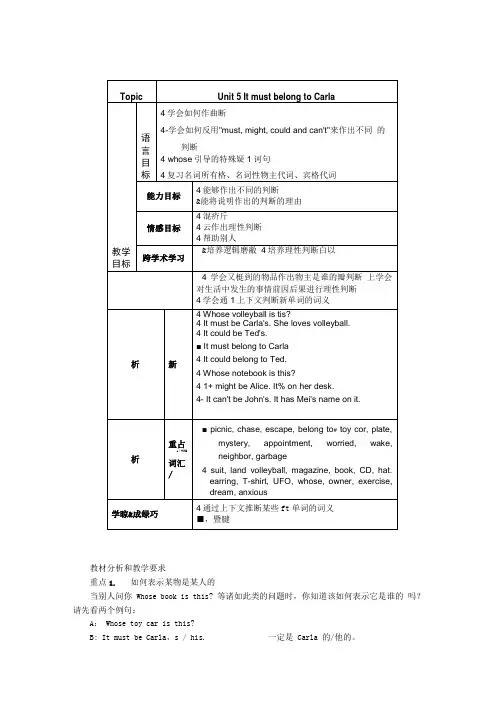
教材分析和教学要求重点1. 如何表示某物是某人的当别人问你Whose book is this? 等诸如此类的问题时,你知道该如何表示它是谁的吗?请先看两个例句:A: Whose toy car is this?B: It must be Carla,s / his. 一定是Carla 的/他的。
or It must belong to Carla / him. 定属于Carla/他。
这两个句子有什么区别吗?对了,第一句回答用的是be+人名+,s ,或者用名词性物主代词;第二种回答用的是belong to +宾格代词。
当你对某件事情作出判断时,答案有时是确定的,有时是不那么确定的,有时是几乎否定的。
在英文中我们就借must (almost 100%) , might / could ( almost 20%--80% ), can' t( zero )来帮忙。
这四个词可以替换上句中must的位置,从而表达不同的意义。
需要特别注意的是,这四个词都是情态动词,因此,其后的动词应该放原形。
重点 2.名词所有格(the possessive case of nouns)1.单数名词加,s eg. Mike' s car, Jeff' s, my mother' s2.以s结尾的复数名词,加' eg. the teachers' room, the twins'3.不以s结尾的复数名词,加's eg. men' s room, children' s重点3. 代词任务设计任务I. 请根据提示完成下列对话。
T: Jack, is this your notebook?Jack: 1. Mine is here.T: 2? Lily, do you know?Lily: It 3 Mary. Her notebook looks like that.T: No, it 4. Hers is on the desk.N: 5. Ken looked for his notebook everywhere just now.T: Ken, 6?K: Oh, yes. 7.任务II. 请根据下文提示填空“must, might, could or can,t”1.The Japanese book 1 be Tony' s. He is the only person who' sstudying Japanese.2The big CD 2 belong to Shanshan. She has a small one.3 . I can' t find my textbook.It 3 be still in the classroom.4 . The tennis ball 4 be Jonny or Bubby' s. They are both onthetenni s team.5 .Those earrings—_5—____ b elong to me. I put all my earrings in thebox.6 . These gloves 6 be his. There? s his name on the back.7 . She thinks it 7 be hers. She' s the only one who ordereda hamburger.8.Oh, the computer game 8 be Jack' s. Jack has been lookingfor that game for an hour. He will be so thankful that you found it.9.一Whose necklace is this?--It 9 be my mother, s. She wears necklace sometimes.10.This sports magazine 10 be Mike' s. Jordan is his favoritebasketball player.任务III.改写下列句子。
第四章 词汇: undergo Vt 经历 affixation n. 附加,附加法 compounding 复合法 conversion 转换法 shortening 缩减法 clipping 裁剪 acronymy 首字母缩略法 blending 混合 suffixation 后缀法 decentralize vt. 使分散 disunite vi. 分散 unwrap vt. 打开 Pejorative prefixes 贬义前缀 maltreat vt. 虐待 pseudo adj. 冒充的,假的 hyper 超级 sub 下 ultra adj. 极端的 ultra-conservative 极端保守的 counter adv. 反方向地 intra pref. 在内 Miscellaneous adj. 混杂的,各种各样的 Denominal adj. 来自名词(形容词)的 Concrete vt. 使凝固;用混凝土修筑 vi. 凝结 Abstract vt. 摘要;提取;使……抽象化;转移(注意力、兴趣等);使心不在焉vi. 做摘要;写梗概 Deverbal adj. 从动词派生出来的词 monomorphemic adj. 单语素结构的 transitive adj. 及物的;过渡的 overwhelming adj. 压倒性的 mythology 神话 though-provoking 发人深思的 要点: 一. The expansion of vocabulary in modern English depends chiefly on
word-formation. Not all the words that are produced by applying the rules are acceptable. Rules only provide a constant set of models from which new words are created from day to day. Rules themselves are not fixed but undergo changes. affixation 30%-40% ,compounding 28%-30% ,conversion 26%, shortening 8%-10% ,( clipping and acronymy) , blending and others 1%-5% 二. Affixation (Derivation) -- the formation of words by adding word forming or derivational affixes to stems.
(derivative派生词) According to their position, affixation falls into: prefixation and suffixation. 1. Prefixation -- the formation of new words by adding prefixes to stems. It does not change the
word-class of the stem but change its meaning.
a). Negative prefixes – a- (abnormal), dis- (disobey), in- (il-, ir-, im-) (injustice), non- (non-smoker), un- (unwilling) un- are the most productive and can usually replace in- or dis- with adj. b). Reversative prefixes – de- (decentralize), dis- (disunite), un- (unwrap)
c). Pejorative prefixes – mal- (maltreat), mis- (mistrust), pseudo- (pseudo-science)
d). Prefixes of degree or size – arch- (archbishop), extra-(extra-strong), hyper-(hyperactive), macro- (macrocosm), micro- (microcomputer), mini- (mini-election), out- (outlive), over- (overweigh), sub- (subheading), super- (superfreeze), sur- (surtax), ultra- (ultra-conservative), under-(underdeveloped)
e). Prefixes of orientation and attitude – anti- (anti-nuclear), contra- (contraflow), counter-, pro-(pro-student)
f). Locative prefixes – extra- (extraordinary), fore- (forehead), inter- (inter-city), intra- (intra-party), tele-, trans-
g). Prefixes of time and order – ex- (ex-wife), fore- (foretell), pre-, re- (reconsider)
h). Number Prefixes – bi-, multi- (poly-) (multi-purpose), semi- (hemi-), tri- (tricycle), uni-(mono-) (uniform)
i). Miscellaneous prefixes – auto-, neo- (neo-Nazi), pan- (pan-European), vice-
2). Suffixation --Suffixation is the formation of new words by adding suffixes to stems. Change the
grammatical function of stems (the word class). Suffixes can be grouped on a grammatical basis. 1. Noun suffixes 1).Denominal nouns (名词+suffix ----名词) a. Concrete -- -eer (engineer), -er (teenager), -ess (hostess), -ette (cigarette), -let (booklet)
b. Abstract -- -age (wastage), -dom (处于…状态)(officialdom), -ery (slavery), -ery (-ry), -hood (childhood), -ing (farming), - ism(…主义)(terrorism), -ship(状态)(sportsmanship) 2).Deverbal nouns (动词+suffix----名词) a. Denoting people -- -ant (assistant), -ee (trainee), -ent (respondent. [法] 被告;应答者), -er(-or)
b. Denoting action, result, process, state, ect. -- -age (linkage n. 连接), -al (dismissal n. 解雇 ) , -ance (attendance), -ation(-ition,
-tion, -sion, -ion), -ence (existence), -ing (savings), -ment (statement)
3).De-adjective nouns (形容词+suffix----名词) -- -ity (popularity), -ness (happiness) Nouns and adjectives suffixes -- -ese (Chinese), -an (Australian), -ist (主义) (socialist)
2.Adjective suffixes 1).Denominal suffixes ---ed (wooded), -ful (successful), -ish (foolish), -less (priceless), -like (lady-like), -ly (friendly), -y (smoky) -al(-ial, - ical) (cultural, residential), -esque (picturesque),
-ic (economic), -ous(-eous, -ious) (coutageous) -ic and –ical can be affixed to the stem in some cases, but differ in meaning. Historic (important in history) historical (of history) Classic (great, memorable) classical (of Latin or Greek) Comic (of comedy) comical (funny) Economic (in the economy) economical (money-saving) Electric (powered by electricity) electrical (of electricity)
2).Deverbal suffixes -- -able (-ible) (washable), -ive(-ative, -sive) (active, decisive) 3.Adverb suffixes -- -ly (calmly), -ward(s) (homewards), -wise (clockwise)